八年级英语课件
合集下载
人教版八年级上册英语第八单元课件(共97张PPT)
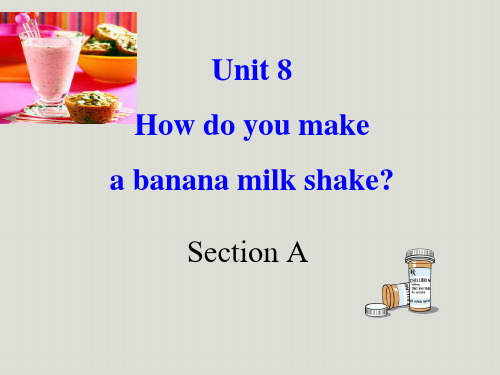
A: How do you make a vegetable salad? B: First…
Next… Then… Finally…
2d Role-play the conversation.
Anna: Sam, I want to make Russian soup for a party on Saturday. Can you tell me how?
A: How many watermelons do you eat every day? B: I eat four./Four.
A: How much honey do you drink every day? B: I drink four teaspoons./Four teaspoons.
__5 Turn on the blender. __2 Cut up the bananas. _6_ Drink the milk shake. _4_ Pour the milk into the blender. _3_ Put the bananas and ice cream into the
Please use many or much to fill in the blanks : 1、A: How _m__u_c_h watermelon do we need ?
B: We need four pieces of watermelon . 2、A: How _m__a_n_y watermelБайду номын сангаасns do we need ?
mango shake
strawberry shake
How to make a banana milk shake?
人教版八年级英语上册课件:Unit 2(共29张PPT)
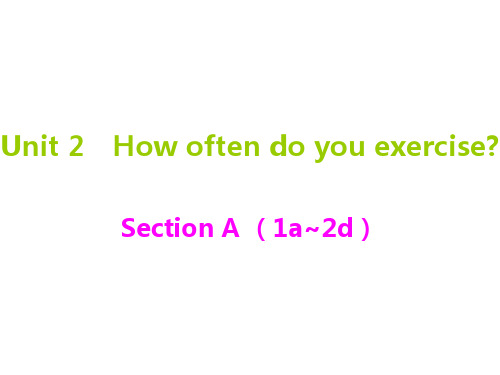
B
要点梳理
( )2. We need a good night’s sleep because we have got a _____ day tomorrow. A. empty B. hungry C. full D. free ( )3. Don’t _____ the bowl with water because it will spill(溢出). A. fill B. full C. filled D. fills
要点梳理
【应用】 ( )1. Sun Yang _____ every day and he swims very well. A. exercise B. exercises C. do exercise D. does exercises
要点梳理
B
( )2. Tom does eye _____ in the classroom after doing math _____ for half an hour. A. exercises; exercises B. exercise; exercise C. exercises; exercise D. exercise; exercises
【举例】He can hardly speak English. 他几乎不会说英语。 They hardly ever spoke another word. 他们几乎没有再说一句话。 He can hardly understand it, can he? 他几乎不懂,是吗?
要点梳理
课前导学
three times a week
use the Internet
swing dance
have to
你周末通常做什么?
要点梳理
( )2. We need a good night’s sleep because we have got a _____ day tomorrow. A. empty B. hungry C. full D. free ( )3. Don’t _____ the bowl with water because it will spill(溢出). A. fill B. full C. filled D. fills
要点梳理
【应用】 ( )1. Sun Yang _____ every day and he swims very well. A. exercise B. exercises C. do exercise D. does exercises
要点梳理
B
( )2. Tom does eye _____ in the classroom after doing math _____ for half an hour. A. exercises; exercises B. exercise; exercise C. exercises; exercise D. exercise; exercises
【举例】He can hardly speak English. 他几乎不会说英语。 They hardly ever spoke another word. 他们几乎没有再说一句话。 He can hardly understand it, can he? 他几乎不懂,是吗?
要点梳理
课前导学
three times a week
use the Internet
swing dance
have to
你周末通常做什么?
Module8Unit1教学课件英语八年级上册(完整版)

accident driver happen mobile phone policewoman road
Listen and underline the correct words.
1 The driver was / was not going fast.2 The driver was / was not looking.3 The driver was / was not talking on his mobile phone.
(肤色)苍白的 出现;显露 转到(某物的)另一边 拐角;街角 (使)碰撞 高兴的;欢喜的
危险;风险 注意力
(物体或形状的)侧面
Expression
in time fall off...
pay attention side by side
及时 从……跌落 注意;留心
并排地;肩并肩地
连连看
pale /peɪl/ appear /ə'pɪə/ round /raʊnd/ corner /'kɔ:nə/ hit/hɪt/ glad /glæd/ risk /rɪsk/ attention /ə'tenʃn/ side /saɪd/
All: Don’t listen to music!
贝蒂:所以那辆汽车撞了那个男孩吗?詹姆斯老师: 没有,我很高兴地说。汽车恰好及时停下,但男 孩从自行车上摔了下来,伤了膝盖。托尼:那太 糟了。詹姆斯老师:所以当你们骑自行车的时候, 想想(发生)事故的风险! 注意,在红灯前停下来 和⋯⋯还有什么?贝蒂:不要骑得太快。大明:不 要和你的朋友们并肩骑行。詹姆斯老师:还有别 的吗?所有人:不要听音乐!
Listen and read. Betty: Good morning, Ms James! You look pale. Are you all right?Ms James: I'm OK, but I saw an accident. A boy was riding his bike and listening to music on the road.Daming: That's very dangerous!Ms James: I was waiting to cross the road. While the lights were changing to red, a ca suddenly appeared round the corner. It wasn't going fast, but it didn't stop.Lingling: Did the boy stop?Ms James: No. And the driver was talking on his mobile phone.
Listen and underline the correct words.
1 The driver was / was not going fast.2 The driver was / was not looking.3 The driver was / was not talking on his mobile phone.
(肤色)苍白的 出现;显露 转到(某物的)另一边 拐角;街角 (使)碰撞 高兴的;欢喜的
危险;风险 注意力
(物体或形状的)侧面
Expression
in time fall off...
pay attention side by side
及时 从……跌落 注意;留心
并排地;肩并肩地
连连看
pale /peɪl/ appear /ə'pɪə/ round /raʊnd/ corner /'kɔ:nə/ hit/hɪt/ glad /glæd/ risk /rɪsk/ attention /ə'tenʃn/ side /saɪd/
All: Don’t listen to music!
贝蒂:所以那辆汽车撞了那个男孩吗?詹姆斯老师: 没有,我很高兴地说。汽车恰好及时停下,但男 孩从自行车上摔了下来,伤了膝盖。托尼:那太 糟了。詹姆斯老师:所以当你们骑自行车的时候, 想想(发生)事故的风险! 注意,在红灯前停下来 和⋯⋯还有什么?贝蒂:不要骑得太快。大明:不 要和你的朋友们并肩骑行。詹姆斯老师:还有别 的吗?所有人:不要听音乐!
Listen and read. Betty: Good morning, Ms James! You look pale. Are you all right?Ms James: I'm OK, but I saw an accident. A boy was riding his bike and listening to music on the road.Daming: That's very dangerous!Ms James: I was waiting to cross the road. While the lights were changing to red, a ca suddenly appeared round the corner. It wasn't going fast, but it didn't stop.Lingling: Did the boy stop?Ms James: No. And the driver was talking on his mobile phone.
人教版八年级英语上册课件:Unit 4(共32张PPT)
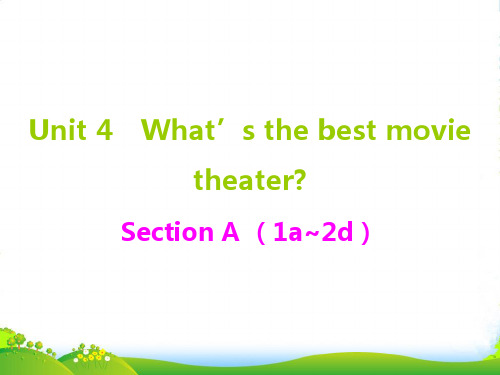
要点梳理
3. You haven’t answered my ____q_u_e_s_ti_o_n____. 4. This ___p_r_o_b_l_e_m___ on the environmental protection floored each of us.
要点梳理
常用句型精讲 “How do you like …”句型的用法 【教材例句】How do you like it so far? 到目前为止 你觉得怎么样?(教材第26页) 【用法】How do you like …?=What do you think of …?意为“你觉得……怎么样?”。这个句型是用 来询问某人对某事的观点、看法。在使用时要注意各自 不同的搭配形式。
课前导学
8. _c_h_e_a_p_l_y__ adv. 便宜地;低廉地 9. ___s_o_n_g___ n. 歌;歌曲 10. ____c_h_o_o_s_e___ v. 选择;挑选 11. ___c_a_r_e_fu_l_ly___ adv. 细致地;小心地;谨慎地 12. ___r_e_p_o_r_t_e_r __ n. 记者 13. ____f_r_e_s_h____ adj. 新鲜的;清新的
要点梳理
【举例】It’s boring to listen to the same story. 听相
同的故事是令人厌烦的。
The boring film makes me fall asleep. 这部无聊
的电影让我几乎睡着。
【拓展】 boring和bored的区别
boring boring意为 用来修 “烦人的;无 饰物 聊的”
bored 意为“无聊的; 用来修
郁闷的”
饰人
人教版八年级上册英语第八单元课件(共97张PPT)
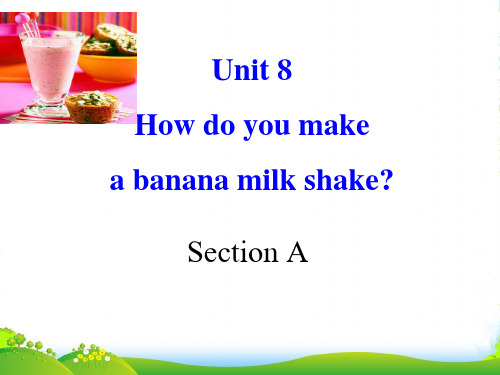
Leading:
1、How many + 可数名词复数形式 + -------? How many students are there in our class? There are sixty one./ sixty one.
2、How much + 不可数名词 + -------? How much water do you drink every day? I drink five glasses./Five glasses.
Do you like fruit salad?
Let’s make our own fruit salad.
To make a fruit salad, what do you need?
Clean and put the fruit in a bowl.
Peel the fruit.
Cut up the fruit.
(注:回答不可数名词量多少时,数词后一定要 有容器量词。)
a cup of tea two glasses of water three pieces of paper four teaspoons of cinnamon
Practice:
A: How many bananas are there in the picture? B: There are three ./Three.
• 2、gladly would learn, and gladly teach.勤于学习的人才能乐意施教。 • 3、is not the filling of a pail but the lighting of a fire. • 4、好的教师是让学生发现真理,而不只是传授知识。 • 5、be unboun than untaught, for ignorance is the root of misfortune与其不受教育,不知不生,因为无知是不幸的根源
八年级上册英语全册课件(人教版)
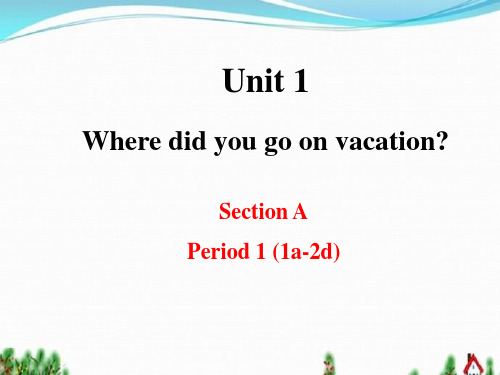
Claire: Twice a week, on Wednesday and Friday. Jack: Well, how about Tuesday? Claire: Oh, I have to play tennis with my friends.
But do you want to come? Jack: Sure.
Where did you go on vacation?
went to New York City
Where did you go on vacation?
went to the beach
Where did you go on vacation?
visited my uncle
Where did you go on vacation?
全北美京著新名A世的M纪C电电影影院院线 I often go to the movies.
I often play football.
What do you usually do on weekends? I often do some reading. I often watch TV.
What do you usually do on weekends?
2a Listen. Cheng Tao is talking about how often he does these activities. Number the activities you hear <1-5>.
3
5 4 2
2b Listen again. Match the activities in 2a with how often Cheng Tao does them.
人教版八年级上册英语全册完整ppt课件

stayed at home
Where did you go on vacation?
went to New York City
Where did you go on vacation?
went to the beach
Where did you go on vacation?
visited my uncle
I decided to go to … David went there last summer vacation. The weather there was … The food … I think it was … So I want to go there next vacation.
2c Role-play conversations between Grace, Kevin and Julie.
Where did you go on vacation?I went to
the
2mountai 1 ns.
4
53
1. Tina 2. Xiang Hua
3. Sally
4. Bob
5. Tom
1c
A: What did Tina go on vacaቤተ መጻሕፍቲ ባይዱion? B: She went to the mountains.
Did you …
go with anyone? Grace go to Central Park? buy anything special?
Yes, I did.
✔
✔
✔
No, I didn’t.
play volleyball?
✔
Kevin swim?
✔
Where did you go on vacation?
went to New York City
Where did you go on vacation?
went to the beach
Where did you go on vacation?
visited my uncle
I decided to go to … David went there last summer vacation. The weather there was … The food … I think it was … So I want to go there next vacation.
2c Role-play conversations between Grace, Kevin and Julie.
Where did you go on vacation?I went to
the
2mountai 1 ns.
4
53
1. Tina 2. Xiang Hua
3. Sally
4. Bob
5. Tom
1c
A: What did Tina go on vacaቤተ መጻሕፍቲ ባይዱion? B: She went to the mountains.
Did you …
go with anyone? Grace go to Central Park? buy anything special?
Yes, I did.
✔
✔
✔
No, I didn’t.
play volleyball?
✔
Kevin swim?
✔
人教版八年级英语上册课件:Unit 6(共31张PPT)

15
要点梳理
3 sure的用法 【教材例句】My parents want me to be a doctor, but I’m not sure about that. 我父母想让我当医生, 但是我还没确定。(教材第42页)
16
要点梳理 【要点思维导图】
17
要点梳理
【举例】 —Are you going with us? 你和我们一起去吗? —Sure. 当然。 I think I can win the match. I am sure of/about
21
要点梳理
(2)在含有when引导的时间状语从句的复合句 中,如果主句和从句的动作都发生在将来,主句用将来 时,时间状语从句用一般现在时表示将来,这种现象被 称为“主将从现”。从句的谓语动词可以是延续性的, 也可以是瞬间性的。 【举例】What is Jerry going to be when he grows up? 杰里长大后想成为什么?
He kept standing during the meeting. 开会时他 一直站着。
12
要点梳理 He kept on working after dark. 天黑后他还继续
工作。 【拓展】与keep相关的短语
13
要点梳理
【应用】 ( C )1. Why did the child _____ crying last night? A. came on B. come on C. keep on D. kept on
8
要点梳理 2 keep的用法 【教材例句】Well, I’m going to keep on writing stories, of course. 嗯,我当然会继续写故事。(教材 第42页) 【要点思维导图】
要点梳理
3 sure的用法 【教材例句】My parents want me to be a doctor, but I’m not sure about that. 我父母想让我当医生, 但是我还没确定。(教材第42页)
16
要点梳理 【要点思维导图】
17
要点梳理
【举例】 —Are you going with us? 你和我们一起去吗? —Sure. 当然。 I think I can win the match. I am sure of/about
21
要点梳理
(2)在含有when引导的时间状语从句的复合句 中,如果主句和从句的动作都发生在将来,主句用将来 时,时间状语从句用一般现在时表示将来,这种现象被 称为“主将从现”。从句的谓语动词可以是延续性的, 也可以是瞬间性的。 【举例】What is Jerry going to be when he grows up? 杰里长大后想成为什么?
He kept standing during the meeting. 开会时他 一直站着。
12
要点梳理 He kept on working after dark. 天黑后他还继续
工作。 【拓展】与keep相关的短语
13
要点梳理
【应用】 ( C )1. Why did the child _____ crying last night? A. came on B. come on C. keep on D. kept on
8
要点梳理 2 keep的用法 【教材例句】Well, I’m going to keep on writing stories, of course. 嗯,我当然会继续写故事。(教材 第42页) 【要点思维导图】
- 1、下载文档前请自行甄别文档内容的完整性,平台不提供额外的编辑、内容补充、找答案等附加服务。
- 2、"仅部分预览"的文档,不可在线预览部分如存在完整性等问题,可反馈申请退款(可完整预览的文档不适用该条件!)。
- 3、如文档侵犯您的权益,请联系客服反馈,我们会尽快为您处理(人工客服工作时间:9:00-18:30)。
一般将来时
一般将来时中表示将来的时间状语: tommorrow, from now on,in future,next
week\day\Monday\month\year
the day after tommorrow等。
一般将来时的否定结构:
主语+ will not+动词原形+…..+将来的时间状语
He will not go to beijijng next week. = He won’t go to beijijng next week.
( Will not = won’t )
一般将来时
一般将来时的一般疑问句结构:
愉快英语教学微课设计作业
课题:一般将来时
学习对象:八年级学生
设计者:赣州市于都县固院初中 胡建华
一般将来时
一般将来时的意义:表示主语在将来的 某时将要做某事。 一般将来时的结构:
主语+ will+动词原形+…+将来的时间状语 He will go to beijijng next week.
一般将来时
Will +主语+ 动词原形+…..+将来的时间状语?
Will he go to beijijng next week?
一般将来时
一般将来时的一般疑问句肯定回答: Yes,主语+wiຫໍສະໝຸດ l. Yes,he will.
一般将来时的一般疑问句否定回答:
No,he won’t.(will not=won’t)
